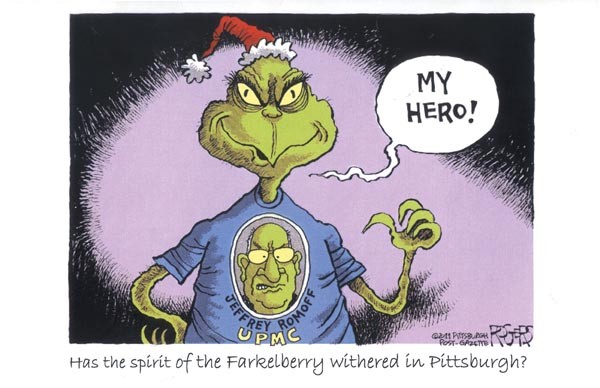Humans grapple with many a mystery during the holidays: the meaning of giving, man's purpose on earth or the specific ingredients of fruit cake. This year saw the addition of another question: Who sent a fake Christmas card soliciting donations on behalf of Children's Hospital of Pittsburgh Foundation while simultaneously making fun of UPMC?
The card's face features Rob Rogers' Nov. 28 cartoon published in the Pittsburgh Post-Gazette, depicting the Grinch wearing a T-shirt with the face of UPMC CEO Jeffrey Romoff. The Grinch is pointing to the T-shirt and saying, "My hero." Underneath it is text asking, "Has the spirit of the Farkelberry [sic] withered in Pittsburgh?"
The message inside the card asks for donations to Children's Hospital. The mailer confused many of its recipients.
"Why would Children's Hospital send out a solicitation in which their leader ... is pilloried and likened to the Grinch?" wonders Lynn Cullen, host of an online talk show broadcast on City Paper's website, who received the card at her home.
Children's did not authorize the card, sent out to at least to a handful of media representatives and state Sen. Jim Ferlo, says hospital spokesman Marc Lukasiak. The hospital says it received no donations as a result of the mailing.
"We'll keep an eye on it to see if it's more widespread than [a few] people getting it," says Lukasiak. "I have no idea why it was sent out, other than it was just a hoax sent to the media."
The first three paragraphs of the card's interior text tap nostalgia for previous free-care-fund donation campaigns — often associated with the term Farkleberry, a fundraising gimmick used years ago by KDKA radio personality Jack Bogut.
But then the text takes a more pointed tone that alludes to the ongoing dispute between UPMC and Highmark, as they grapple with a contract to allow Highmark subscribers to use UPMC physicians and facilities.
"Thousands of Pittsburgh children will needlessly suffer beginning next year," the card asserts, "When prices are tripled for all those families here who have health insurance, just not the right color of health insurance. Not just because costs have increased, just because."
But as Lukasiak points out, such claims are inaccurate: Children's contract with Highmark continues until 2022.
There are also jabs to other nonprofits, via statements like, "Children['s] Hospital needs your gifts more than those bell ringers with red kettles," and on a separate donation card stating, "minimum contribution accepted $75; loose change is good enough for the GoodFellows, but the Free Care Fund needs more."
The card has numerous, detailed accents: It's printed on laminated card stock and in color; it contains a smaller card and return envelope addressed to the hospital's foundation; and a sticker on the back of the envelope features the Grinch's dog Max, threatening "Give, or we'll take out Toys for Tots and use this dog as a research animal."
"They should be applauded for their creativity," says Cullen. "I think they sent it out because they hate UPMC, like all good Pittsburghers, and their creative juices were working overtime."
But not everyone found the card amusing. Ferlo plans to forward the materials to the state Attorney General's office.
"I don't think people should be invoking important and worthy efforts" to make a political statement, he says. "It's inappropriate. If you have some advocacy point, make it an appropriate way. It's so convoluted whatever that message is."
As for the Grinch cartoon, the Post-Gazette and Rogers say they weren't asked for permission to use the cartoon — which was only available in black and white in the paper, yet appeared in color on the card. "Somebody painstakingly colored that in," says Rogers.
Rogers says he typically doesn't like his work used in other people's satirical efforts.
"Just from what I've heard about it, the satire failed because there is too much talk about who did it. ... It's also confusing as to the exact message. If you have that many questions at the end of the day, the satire didn't work," Rogers says. "Maybe that's what the person had in mind, ... is to confuse anyone who got it ... and we're talking about it, so maybe that's what they wanted."
















